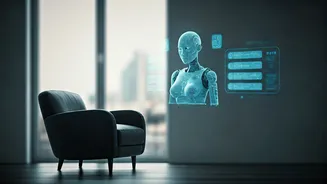The AI Therapist Dilemma
The advent of sophisticated AI has led to the development of chatbots designed to offer support and guidance, including in areas related to mental health.
The allure of readily available, always-on therapeutic assistance is undeniable. However, the American Psychological Association (APA) and other experts are concerned about the potential dangers of using AI chatbots as therapists. They emphasize that while these chatbots might seem helpful on the surface, they lack the nuanced understanding, empathy, and ethical considerations crucial for effective mental health care. The psychologists warn about the possibility of AI providing inaccurate or potentially harmful advice, and the absence of a human therapist's capacity to recognize and respond to complex emotional cues. The advisory particularly addresses the risks for vulnerable individuals who might be more susceptible to the limitations and biases inherent in AI-driven systems.
Risks and Limitations Explained
The primary concern of the psychologists revolves around the limitations of AI in replicating the therapeutic relationship. A core aspect of effective therapy is the ability of the therapist to build trust, understand individual contexts, and tailor the treatment to specific needs. AI chatbots, although capable of processing vast amounts of information and generating responses, are unable to establish this kind of connection. They operate based on algorithms and pre-programmed responses, missing the essential components of empathy and human intuition. Another significant risk is the potential for AI chatbots to misinterpret user input, leading to inaccurate or inappropriate guidance. This can be especially dangerous for individuals struggling with serious mental health conditions, as the AI's suggestions might not align with professional treatment strategies. The psychologists highlight the importance of ethical considerations, such as confidentiality and the responsibility to protect vulnerable users, which AI chatbots may not always adequately address.
Human Connection Matters
Human therapists bring a wealth of experience, education, and ethical training to their practice. They can assess a client’s emotional state, identify underlying issues, and provide personalized support in a way that AI cannot. The ability to recognize non-verbal cues, understand cultural nuances, and build a therapeutic alliance is fundamental to successful therapy, features that are currently beyond the scope of AI technology. Moreover, a human therapist can navigate complex situations and ethical dilemmas that AI may not be programmed to handle. The psychologists strongly advise individuals to seek mental health support from licensed professionals who are trained to provide effective, safe, and ethical care. While AI can potentially serve as a supplementary tool, it should not replace the crucial role of human interaction in the therapeutic process.













